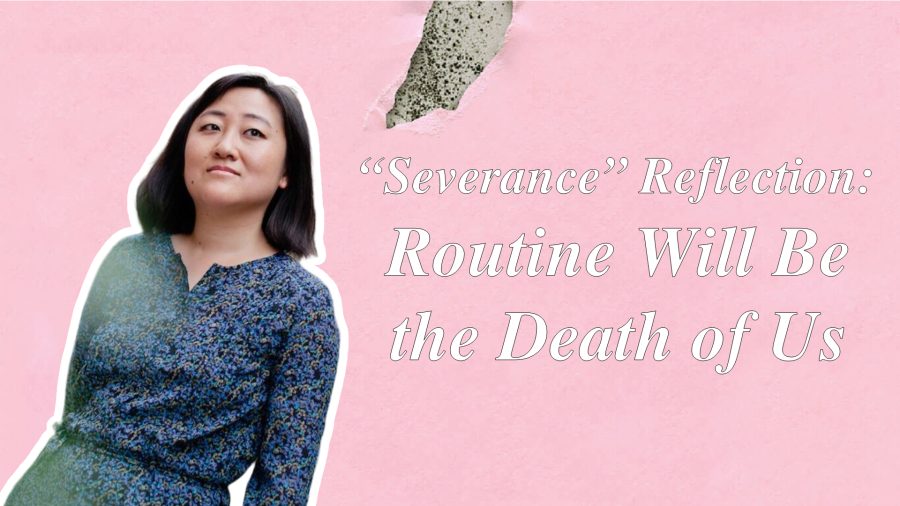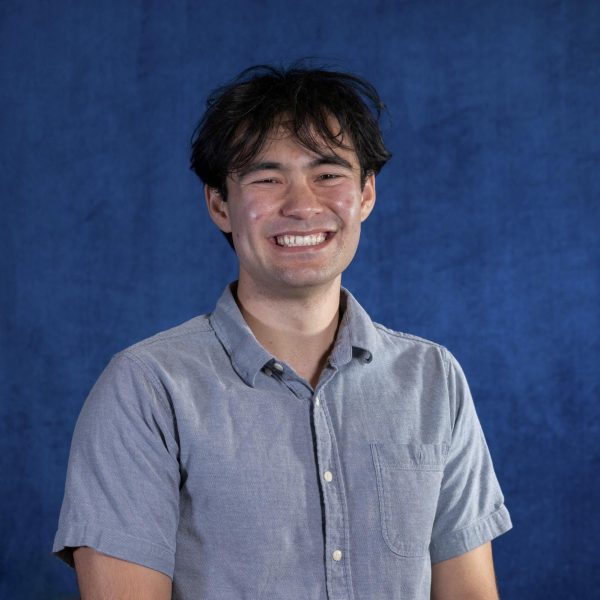“Severance” Reflection: Routine Will Be the Death of Us
Jan 22, 2023
Ling Ma’s end of the world is monotony, and the strength we get to persevere through bleakness is purpose.
“Severance” is a science fiction novel written by Ling Ma that begins with the undoing of civilization when a viral infection ravages much of the world. Known as “Shen Fever,” the fictional illness and its impact bear heavy similarities to COVID-19 despite being published in late 2018, over a year prior to the start of the pandemic. Both viruses originated in China, spread rapidly in heavily populated spaces and in areas that handled large industry shipments, initiated country-wide lockdowns, caused a fall in industry, and forced people to re-evaluate their lives and the way they spend their time. Ma’s satirical critique of capitalism hailed her as an oracle of the pandemic. This makes her first novel both an incredibly eerie read and a more prevalent one.
Society underwent massive self-reflection, emotional turmoil, and existential crises as a result of COVID-19. Personally, it feels as though many of these important and hard conversations flattened out again as the world around us picked back up. I remember sitting with my friends in our backyards, more than six feet apart, and talking about nothing besides our feelings because when the world slowed, that was all we had. We grew a lot from those conversations. But now we’re far apart, leading new lives, and when we reconvene, there’s so much to fill each other in on that, sometimes, we lose track of the important questions we used to hold for each other. “Severance” not only helps ignite many of these buried feelings but also doubles down on them because, unlike COVID-19, Shen Fever is always fatal for all who contract it. There was never any time for life to return to its constant flow.
The novel centers around Candace Chen and begins with her breakup with her partner Jonathan. Jonathan was a large part of her life in the years that followed her parents’ passing, but he eventually wanted to leave New York. Candace does not want to leave with him because she cannot abandon her position at a publishing company, and with her support system thinning, she dives further into the job she stumbled into. She is not passionate about what she does, but she is loyal to her company and what it asks of her. Her life becomes an unrelenting routine, where day in and day out, everything is the same. Even as Shen Fever dissolves the world around her, she finds herself in the office carrying out her contract.
Before anything else, it is important to understand what Shen Fever does to a person. Once infected, a person becomes a shell, forced to repeat their most recent or consistent routine mindlessly. A person afflicted with the illness might take out clothes from their closet, lay them on their bed, and hang them back up again — all the while neglecting to eat, drink, sleep, or partake in any action that might sustain them. Shen Fever causes death by absent-minded routine and rigid monotony. Viciously committed to her work, the line between fevered activities and Candace’s personhood becomes blurry. Candance is distinguished by her thought processes and freedom of choice, but if she chooses to stay in one space until the end of time, does that make her any different than the fevered? Perhaps eating and drinking are merely acts to prolong such a routine that, at the end of the day, is meant to serve capitalistic ideals.
Two timelines run simultaneously throughout “Severance,” alternating frequently. The first one starts with Candance’s childhood and the key instances that shaped her life and runs until the end of the world begins. The second one begins after she leaves a run-down New York and joins a group of people who banded together to survive. Travel subdues her, but time is also to blame. She once had immense freedom in her young adulthood, although she can’t remember if she was truly happy even then. It’s hard to find happiness without purpose, especially when purpose itself is an incredibly arbitrary concept. In every part of Candace’s life, she feels aimless in some capacity, but the world seems to be structured for endless emptiness. It gears her toward servitude and makes her hollow once entrenched in it. The world pressures her into a routine and waits for the monotony to kill her. All Shen Fever ever does for others is speed up the process.
Ma encapsulates Candace’s aimlessness succinctly early on as she describes how Candance would wander New York for hours on end in the days when she was fresh out of college and unemployed. From early in the morning until the sun began to set she was walking around the city, finding its communities, secrets, grit, and glamor. She would stop for lunch, usually something cheap in Chinatown, and then begin. She would bring her camera and photograph the city and its vulnerable places. Eventually, she started a blog. Intimate pictures of New York were published anonymously. From the reader’s perspective, despite Candace’s wandering, the blog seems to ground her. She finds a purpose by encapsulating the world around her. She makes a purpose out of nothing.
Around halfway through the novel, the audience discovers that Candance is pregnant. In spite of everything that seems to dissuade her from keeping the baby, she chooses to do so anyway. It is this decision that solidifies a shift in her character. Her active decision-making — the choice to no longer fall down the path of least resistance — makes her more solid. She is giving herself purpose again. Not from the standpoint that her womanhood is defined by her ability to have children, but by making a decision that takes her out of the monotony and thinking about something or someone other than her employers and contract. The opportunity to leave the city with Jonathan may have granted her a similar purpose or freedom. It’s about choosing to do something that transcends obligation and creates something we want to fight for. This is how Ma advocates that we keep our heads above the waters of monotony that otherwise might be the death of us. The most effective use of our freedom is finding or creating something worth living for and choosing it over and over again.
I count myself lucky for finding this novel in the time that I did, at the cusp of a new year and as COVID’s daily impact on life seems to wane. I’ve never been one for resolutions, but this novel inspired me to make some, and my favorite among them has been journaling. I’ve been ending my days by chronicling them so that I might look back and recall the little things that I choose to love. I think freedom is self-defined. You do not have to move away from your routine or abandon the structure, you just have to make your life serve you in a way that brings you joy. For example, I can’t say I am a fan of all my classes, but I like that some of them force me to wake up early so that I can take in more of the day and enjoy the sun I find myself needing more and more. I like that they force me to walk across our campus, which I find genuinely beautiful. I like talking to new people in classes and sitting with old friends. I find freedom in finding things to enjoy in my routine. And if freedom is a choice, I’ll keep choosing to appreciate the life that I live.
Image courtesy of Helix Creative Solutions


















eva • Jan 23, 2023 at 12:43 pm
I earn more than $27,000 USD every month working part-time. I listened to several folks describe how much money they nd-02 would fairly expect to make online, so it’s still tough to say. It all became genuine, and it dramatically changed my life. Everyone should now kb-56 try their hand at this field of business. By accessing
.
.
This website———————— >>> GOOGLE HOME JOBS